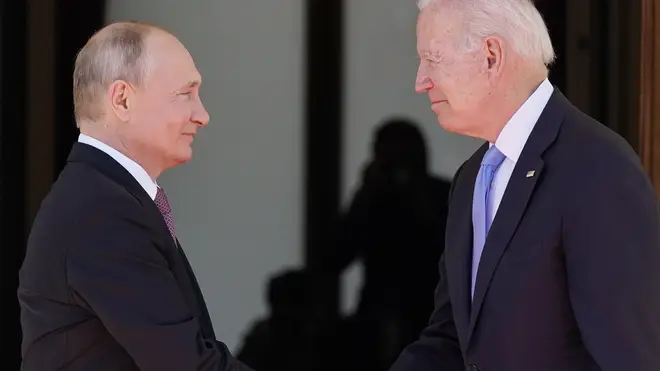
Ian Payne 4am - 7am
7 December 2021, 11:54

The US leader was vice president in 2014 when Russia annexed the Black Sea peninsula of Crimea from Ukraine.
US president Joe Biden is set to warn Russian president Vladimir Putin that his country will face economy-jarring sanctions if it invades neighbouring Ukraine.
The American leader’s comments were anticipated as he seeks a diplomatic solution to deal with the tens of thousands of Russian troops massed near the Ukraine border.
Mr Biden aims to make clear that his administration stands ready to take action against the Kremlin that would exact “a very real cost” on the Russian economy, according to White House officials.
Mr Putin, for his part, is expected to demand guarantees from Mr Biden that the Nato military alliance will never expand to include Ukraine, which has long sought membership. This is a non-starter for the Americans and their Nato allies.
“We’ve consulted significantly with our allies and believe we have a path forward that would impose significant and severe harm on the Russian economy,” White House press secretary Jen Psaki said in a preview of the meeting.
“You can call that a threat. You can call that a fact. You can call that preparation. You can call it whatever you want to call it.”
The leader-to-leader video-call conversation on Tuesday – with Mr Biden speaking from the Situation Room in Washington and Mr Putin from his residence in Sochi – is expected to be one of the toughest of Mr Biden’s presidency and comes at a perilous time.
US intelligence officials have determined that Russia has massed 70,000 troops near the Ukraine border and has made preparations for a possible invasion early next year.
The US has not determined whether Mr Putin has made a final decision to invade. But Mr Biden intends to make it clear to the Russian leader that there will be a “very real cost” should Russia proceed with military action, according to a senior administration official.

Mr Biden was vice president in 2014 when Russian troops marched into the Black Sea peninsula of Crimea and annexed the territory from Ukraine.
Aides say the Crimea episode – a significant moment for former US president Barack Obama on the international stage – looms large as Mr Biden looks at the current smouldering crisis.
Mr Biden vowed as a candidate to reassert American leadership after former president Donald Trump’s emphasis on an “America first” foreign policy.
But Mr Biden has faced fierce criticism from Republicans who say that he has been ineffective in slowing Iran’s march towards becoming a nuclear power and that the Biden administration has done too little to counter autocratic leaders like China’s Xi Jinping, Iran’s Ayatollah Ali Khamenei and Mr Putin.
“Fellow authoritarians in Beijing and Tehran will be watching how the free world responds,” Senate minority leader Mitch McConnell said.
“And President Biden has an opportunity to set the tone when he speaks with Putin.”
Mr Biden spoke with UK, French, German and Italian leaders on Monday to co-ordinate messaging and potential sanctions.
The White House said in a statement that the leaders called on Russia to “de-escalate tensions” and agreed that diplomacy “is the only way forward to resolve the conflict”.
Ahead of the Biden/Putin call, Secretary of State Antony Blinken spoke with Ukrainian president Volodymyr Zelenskyy, who wrote on Twitter that he and Mr Blinken “agreed to continue joint and concerted action” and expressed his gratitude to the US and allies for providing “continued support of our sovereignty and territorial integrity”.
The Kremlin has made clear that Mr Putin plans to seek binding guarantees from Mr Biden precluding Nato’s expansion to Ukraine. Mr Biden and his aides have indicated that no such guarantee is likely, with the president himself saying he “won’t accept anyone’s red line”.
Ms Psaki stressed that “Nato member countries decide who is a member of Nato, not Russia. And that is how the process has always been and how it will proceed”.
But Mr Putin sees this as a moment to readjust the power dynamic of the US/Russia relationship.
“It is about fundamental principles established 30 years ago for the relations between Russia and the West,” said Fyodor Lukyanov, a leading Moscow-based foreign policy expert.
“Russia demands to revise these principles, the West says there’s no grounds for that. So, it’s impossible to come to an agreement just like that.”
Beyond Ukraine, there are plenty of other thorny issues on the table, including cyberattacks and human rights. Kremlin spokesman Dmitry Peskov said US/Russian relations were overall in “a rather dire state”.
Both the White House and the Kremlin have sought to lower expectations ahead of the call. Both sides said they did not expect any breakthroughs on Ukraine or the other issues up for discussion, but that the conversation itself would mark progress.
Kremlin spokesperson Dmitry Peskov said: “Putin has repeatedly said that we look for good, predictable relations with the US”.
“Russia has never planned to attack anyone. But we have our own concerns, our own red lines, the president spoke clearly about that.”
Mr Peskov reiterated that breakthroughs should not be expected and that it would be a “working conversation during a very difficult period”, when “escalation of tensions in Europe is off the scale, extraordinary”, and required “personal discussion on the highest level”.